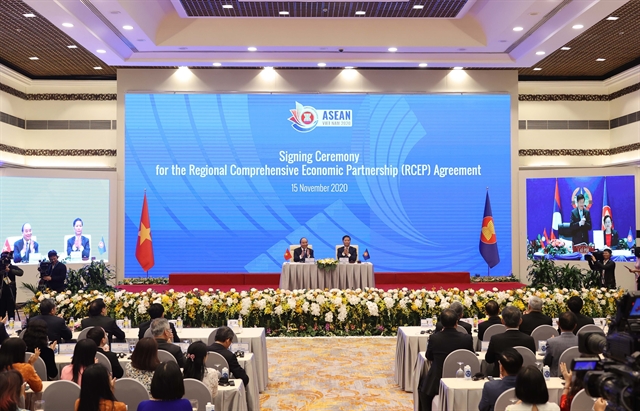The Regional Comprehensive Economic Partnership, the world’s largest trade pact, was signed on Sunday after eight years of negotiations.

The Regional Comprehensive Economic Partnership, the world’s largest trade pact, was signed on Sunday by leaders of 15 member countries after eight years of negotiations.
The region-wide trade deal which involves ten ASEAN countries, as well as China, Japan, the Republic of Korea, Australia and New Zealand, will contribute to nearly 30 per cent of the world’s Gross Domestic Products of US$26.2 trillion and create a market covering nearly one third of the world’s population.
It is expected to back an open, inclusive and rule-based trade system and create a push for post-COVID-19 economic revitalisation among the member countries.
Speaking at the signing ceremony, Vietnamese Prime Minister Nguyen Xuan Phuc said after eight years of negotiations, ASEAN and partners have finished an enormous workload and preparations for a new promising face of economic and trade cooperation.
“The RCEP agreement will accelerate the ASEAN economic community building and thereby allowing ASEAN to become dynamic and strong partners in promoting co-operation for shared prosperity.
“The signing ceremony of RCEP today is a very proud and historic milestone within ASEAN countries together with its partners having laid a solid foundation for new era, a comprehensive, enduring and forward-looking cooperation while taking into account the diverse development level of countries in this region.”
According to Luong Hoang Thai, director of the Vietnamese Ministry of Industry and Trade’s Multilateral Trade Policy Department, with provisions to reduce or remove tariffs on industrial and agricultural products, the RCEP will help firms in ASEAN member states boost exports, particularly to major trade partners.
He suggested Vietnamese companies improve their competitive edge by paying attention to trade policies, renewing technologies, and landing large investments in services.
Vietnamese Minister of Industry and Trade Tran Tuan Anh said that once the RCEP takes effect, Vietnamese companies will have more opportunities to expand markets, join regional value chains, and attract more foreign investment.
Telecommunications, IT, garments and textiles, footwear, and agriculture can take huge advantage of import tariff reductions under the agreement, he stressed.
The RCEP is a proposed free trade agreement between the 10 member states of ASEAN and six dialogue partners, namely China, Japan, the Republic of Korea, India, Australia and New Zealand. Negotiations on the RCEP started in late 2012 at the 21st ASEAN Summit in Phnom Penh.
During last-minute talks on November 4 last year, with Thailand as ASEAN Chair, India pulled out of joining the RCEP over unresolved issues, especially those concerning agricultural tariffs. — VNS





